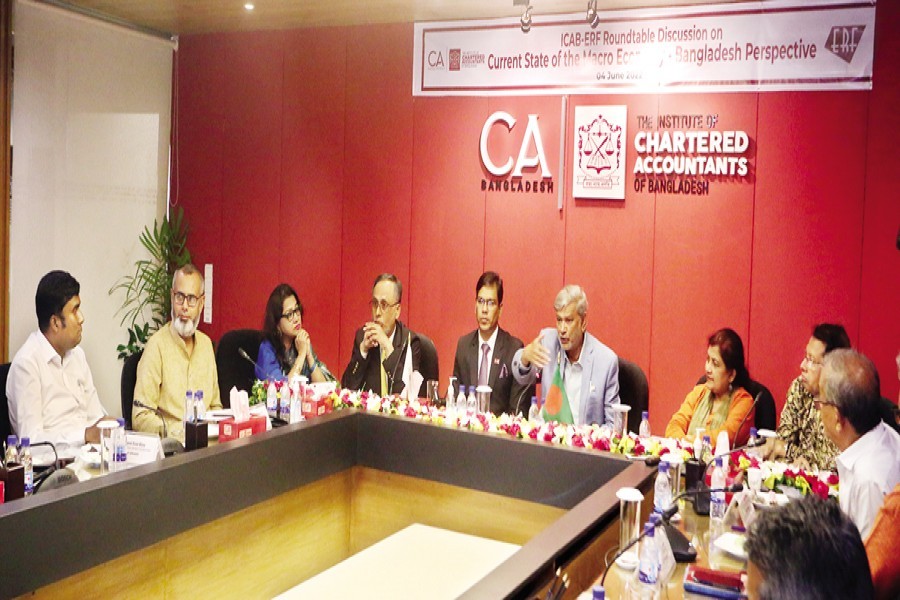Planning Minister MA Mannan on Saturday suggested slashing gradually the subsidies on agriculture despite massive price hike of the inputs in the international markets.
"In recent years, the economic condition of many farmers has been transformed into a better state. So, it is time to review the agriculture subsidies," he said at a discussion on macro-economy at the CA Bhaban in Dhaka.
"We have to think now whether we'll provide the financial support with a blank eye or will slash it gradually."
The minister was speaking as chief guest at the discussion on "Current state of macro-economy: Bangladesh perspective", jointly organised by the Economic Reporters Forum (ERF) and The Institute of Chartered Accountants of Bangladesh (ICAB).
Taking part in the discussion, the economists, however, expressed different views about the continuation of the subsidies.
Policy Research Institute (PRI) Executive Director Dr Ahsan H Mansur also favoured cutting the agriculture subsidies as the prices of the main inputs like fertiliser and oil were increasing across the globe.
"How long the country will bear the burden. If you do not cut the subsidies, your agriculture sector capacity will not increase and it will also lose its competitiveness," he added.
Economist and Director General of the Bangladesh Institute of Development Studies (BIDS) Dr Binayak Sen said the agriculture subsidies must continue as food supply is the first priority in the economy.
Centre for Policy Dialogue (CPD) distinguished fellow Professor Mustafizur Rahman said the capacity of the agriculture sector will have to be increased.
"Some 40 per cent labour forces of the country are engaged with the sector. But their production share is only 13 per cent of GDP, showing a gap. So, we have to think about the capacity building of this sector. Its transformation into the manufacturing sector is required," he added.
Policymakers, businessmen and economists were also divided over the issue of providing incentives on the inflow of wage earners' remittance.
Metropolitan Chamber of Commerce and Industry (MCCI) President Md Saiful Islam said the incentives on remittance should be continued for increasing the country's foreign exchange reserves.
Economics Professor of Dhaka University Dr Abu Yusuf suggested increasing the incentives.
However, Planning Minister MA Mannan said he suggested the government earlier not to offer the incentives for all remittance senders in a blank eye rather than on the status and their volume of foreign exchange by the Non-Resident Bangladeshis (NRBs).
Professor Mustafizur Rahman of CPD also differed with the continuation of the incentives for this moment, saying: "The USD rate has been increased to Tk 97 from Tk 81. Now, you have to think whether you need to offer more incentives to the remitters."
On the macro-economic front, the economists, analysts and businessmen suggested taking some prudent decisions on foreign exchange reserves, its rate and inflation management.
Prof Mustafizur Rahman of CPD said that although Bangladesh's macro-economic scenario was better for its higher GDP growth and lower inflationary trend, in recent days, those comfortable zones have been affected with the emergence of many local and external factors.
"Although Bangladesh's economy is not comparable with Sri Lanka, we should learn from our neighbouring nation," the economist said.
He said: "The institutional weakness is the big problem at this moment in Bangladesh. For example, the 7th Five-Year Plan took a target to raise the tax-GDP ratio to 14 per cent in FY2020. But it was raised to only 9.0 per cent. So, there is a weakness in revenue generation by the NBR. Investment for institutional capacity building is imperative now."
Prof Mustafizur suggested being selective in taking up development projects to reduce the pressure on the foreign exchange and cut the budget deficit.
The Padma Bridge is a good project, but its railway connection is not imperative at this moment, he added. "When we will have to go for debt servicing with a higher USD rate, pressure on the fiscal management will increase," he added.
Dr Ahsan Mansur said the central bank's recent decision on floating the foreign exchange rate was a time-befitting action. "But if the central bank does not apply its proper monetary and fiscal policy time-to-time, the economy could face another pressure," he added.
He suggested the Bangladesh Bank withdraw the cap on the bank interest rate for weathering any possible shock on the economy.
Dr Mansur stressed the need for expanding the tax net for managing the economy prudently.
The programme was also addressed by former Dhaka Chamber of Commerce and Industry (DCCI) Abul Kashem, ICAB President Shahadat Hossain, ERF President Sharmin Rinvy, AFP Bureau Chief in Bangladesh M Shafiq Alam, and Policy Exchange Chairman Masrur Reaz.


